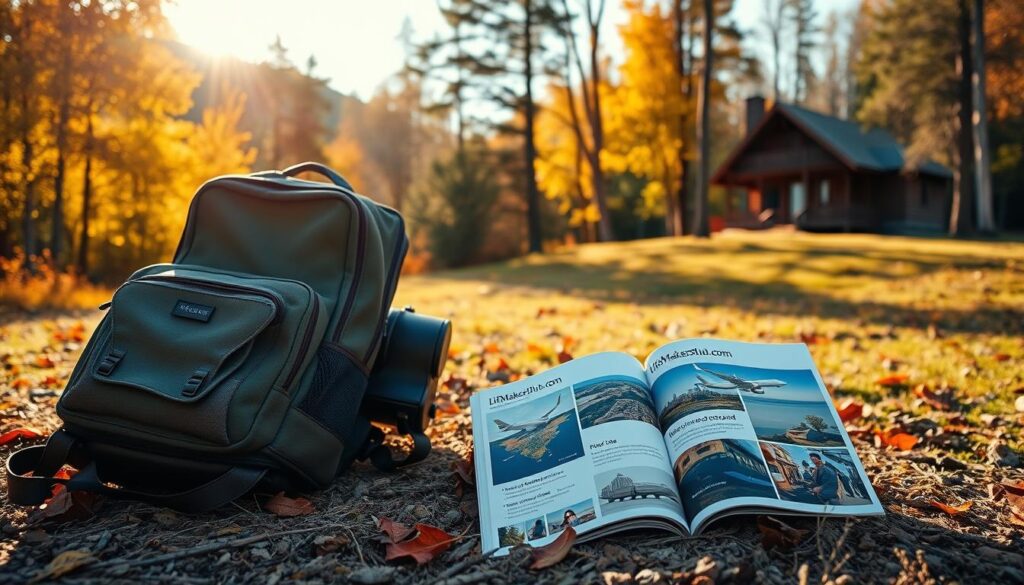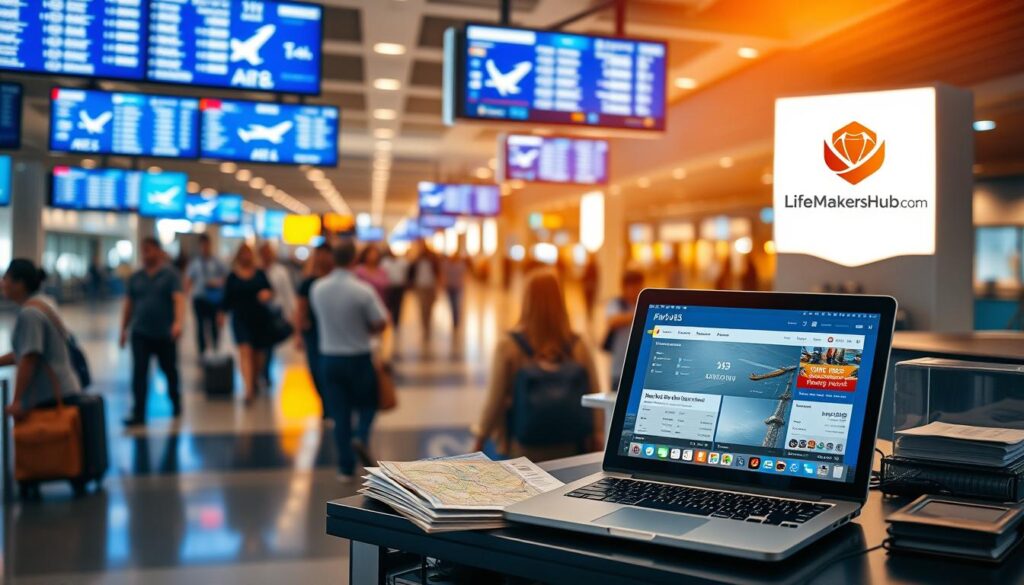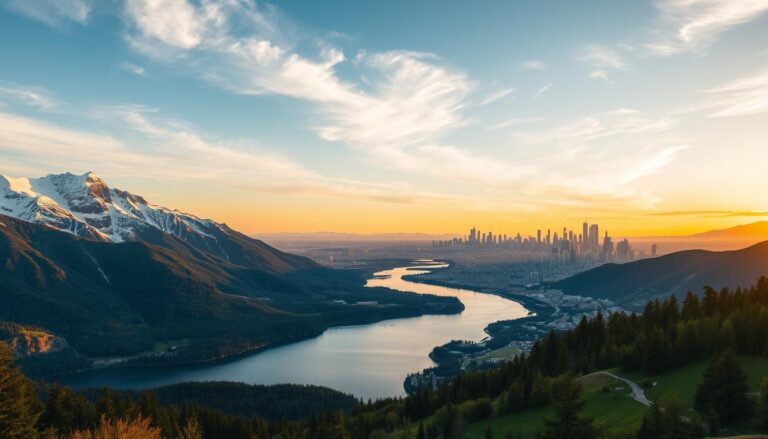Budget Travel Made Easy: Explore the World Without Breaking the Bank
Exploring the world doesn’t have to drain your savings. With careful planning and smart choices, you can enjoy unforgettable trips to incredible destinations. Whether it’s a bustling city or a serene countryside, there’s a place for every traveler.
One of the best ways to save money is by booking flights in advance. Traveling during off-peak seasons can also significantly reduce costs. Accommodation options like hostels or home swaps offer comfort without the high price tag.
This guide is designed to help you make the most of your vacation. From comparing flight prices to finding affordable food and activities, we’ll share practical tips to stretch your money further. Let’s turn your dream trip into a reality!
Key Takeaways
- Plan your trip in advance to secure the best deals on flights and accommodations.
- Travel during off-peak seasons to save on costs and avoid crowds.
- Consider staying in hostels or home swaps for affordable lodging.
- Explore local food options to save money and enjoy authentic experiences.
- Use public transportation to cut down on travel expenses.
- Take advantage of free or low-cost activities in your destination.
- Track your expenses to stay within your travel budget.
Planning Your Budget Travel Adventure
Turning your dream vacation into reality starts with a clear plan. Whether you’re exploring a bustling city or relaxing in a serene countryside, defining your goals early helps you stay focused and save money. Let’s dive into how you can create a roadmap for your next adventure.
Setting Clear Goals and Trip Purpose
Before booking anything, ask yourself: What’s the purpose of this trip? Are you seeking adventure, relaxation, or cultural immersion? Defining your goals transforms a vague idea into a focused plan. For example, if your priority is learning, allocate more funds to guided tours or museums.
Aligning your trip’s purpose with your spending ensures every dollar is used wisely. This approach also makes it easier to compare flight prices and manage costs. Start by listing your must-see destinations and activities, then prioritize them based on your interests.
Mapping Your Itinerary and Scheduling Essentials
A detailed itinerary prevents unexpected expenses and last-minute stress. Begin by securing your flights and accommodation ahead of time. This not only saves money but also gives you peace of mind. Use free online tools like Google Trips or TripIt to organize your schedule.
Here’s a comparison of popular planning tools:
| Tool | Features | Cost |
|---|---|---|
| Google Trips | Itinerary organization, offline access | Free |
| TripIt | Flight tracking, alerts | Free (Pro version: $49/year) |
| Wanderlog | Collaborative planning, maps | Free (Premium: $5/month) |
Don’t forget to schedule essentials like accommodation bookings and itinerary milestones. This step ensures you allocate your money wisely and avoid overspending. With a clear plan, you’ll enjoy your trip without worrying about unexpected costs.
Traveling Off-Season for Maximum Savings

Timing your trip right can unlock significant savings and unique experiences. By avoiding peak seasons, you not only save money but also enjoy a more relaxed and authentic journey. Let’s explore how off-season travel can transform your next adventure.
Understanding Peak, Shoulder, and Off-Season Dynamics
Travel seasons are divided into three categories: peak, shoulder, and off-season. Peak season is when destinations are busiest, often coinciding with school holidays. Shoulder season falls between peak and off-season, offering a balance of good weather and fewer crowds. Off-season is the quietest time, with lower demand and prices.
Traveling during off-season can save you up to 50% on flights and accommodations. For example, visiting popular spots like Angkor Wat or Chichen Itza during quieter months means fewer crowds and a more intimate experience. This timing also allows you to explore at your own pace without the stress of long lines or packed attractions.
Booking Flights and Accommodation When Demand is Low
One of the biggest advantages of off-season travel is the reduced cost of flights and lodging. Airlines and hotels often lower their prices to attract visitors during quieter times. For instance, flights to European cities can be 20–50% cheaper in winter compared to summer.
Using flight comparison tools can help you track price drops and secure the best deals. Similarly, accommodations like hotels and vacation rentals often offer discounts during off-peak periods. This approach not only saves money but also gives you access to better options that might be fully booked during peak times.
By carefully planning your trip around low-demand periods, you can enjoy significant savings and a more fulfilling experience. Whether it’s a serene beach or a bustling city, off-season travel opens up a world of possibilities without breaking the bank.
Smart Accommodation Strategies for Budget Travelers
Finding the right place to stay can make or break your trip. Where you lay your head at night impacts not only your comfort but also your wallet. Fortunately, there are plenty of affordable options that offer more than just a bed—they provide unique experiences and local insights.
Exploring Hostels, Airbnbs, and Couchsurfing
Hostels are a classic choice for travelers looking to save money. They offer communal rooms and shared spaces, making them perfect for solo adventurers or groups. Many hostels also organize social events, helping you meet like-minded people from around the world.
Airbnbs provide a homey alternative to traditional hotels. Renting a room or an entire apartment can be cost-effective, especially for longer stays. Plus, having access to a kitchen allows you to save on food expenses.
Couchsurfing takes affordability to the next level by connecting travelers with local hosts. This option is not only free but also offers a chance to immerse yourself in the culture of your destination. As one traveler put it, “Couchsurfing isn’t just about a free place to sleep—it’s about building connections and learning from locals.”
Discovering House Sitting and Home Swaps
House sitting is a win-win for travelers and homeowners. You get free accommodation in exchange for taking care of someone’s home and pets. This arrangement often includes perks like access to a fully equipped kitchen and insider tips from the homeowner.
Home swapping is another innovative way to save money. By trading homes with someone in your desired destination, you can enjoy a comfortable stay without the high price tag. It’s an excellent option for families or groups traveling together.
Here’s a quick comparison of these accommodation options:
| Option | Cost | Experience |
|---|---|---|
| Hostel | Low | Social, communal |
| Airbnb | Moderate | Homey, private |
| Couchsurfing | Free | Cultural, personal |
| House Sitting | Free | Local, immersive |
| Home Swap | Free | Comfortable, spacious |
Choosing the right accommodation can transform your trip. Whether you’re looking to save money, meet new people, or live like a local, these strategies offer something for every traveler.
How to Find Deals on Flights and Transportation

Saving on flights and transportation can make your trip more enjoyable and affordable. With the right tools and strategies, you can stretch your money further and focus on the experiences that matter most. Let’s explore how to find the best deals and make smart choices for your journey.
Utilizing Flight Comparison Tools and Alerts
Flight comparison tools like Google Flights and Kayak are essential for finding the best prices. These platforms allow you to compare fares across multiple airlines and set up alerts for price drops. For example, Google Flights’ “Cheapest” tab highlights the lowest available options, while Kayak’s +/- 3 days feature helps you identify the most affordable dates to fly.
Booking midweek, especially on Tuesdays or Wednesdays, can save you up to 20% on ticket prices. As one expert noted, “Flexibility with your travel dates is one of the easiest ways to cut costs.” Setting up alerts ensures you never miss a deal, making it easier to plan your trip without overspending.
Embracing Public Transport for Local and Long-Distance Trips
Public transportation is a cost-effective way to explore your destination. Trains and buses often offer scenic routes and a chance to experience local life. For longer distances, budget airlines like Icelandair provide affordable options, sometimes with added perks like free stopovers.
Packing light can also save you money, as many budget airlines charge extra for checked baggage. By using public transit and choosing budget carriers, you can allocate more of your money to activities and experiences. As one traveler shared, “Taking the train not only saved me money but also gave me a deeper connection to the places I visited.”
Advanced planning and flexibility are key to saving on transportation. Whether it’s booking flights on less popular days or opting for public transit, these strategies ensure you get the most out of your trip without breaking the bank.
Creative Ways to Save on Food and Activities
Discovering new places doesn’t have to come with a hefty price tag. By focusing on local food and entertainment, you can enjoy authentic experiences while keeping costs low. Let’s explore how to make the most of your trip without overspending.
Sourcing Affordable Local Eateries and Fresh Markets
One of the best ways to save money is by eating like a local. Skip the overpriced restaurants and head to fresh markets or modest eateries. These spots not only offer delicious meals but also give you a taste of the culture.
Street food is another great option. It’s often cheaper and quicker than dining in a restaurant. As one traveler shared, “Sampling street food in Bangkok was not only affordable but also one of the highlights of my trip.”
If you’re staying in a place with a kitchen, consider preparing some meals yourself. This can save you a lot of money, especially for breakfast or snacks. Plus, shopping at local markets for ingredients can be a fun and immersive experience.
Finding Free and Low-Cost Entertainment Options
Entertainment doesn’t have to be expensive. Many cities offer free walking tours, community events, and cultural activities. These are great ways to explore without spending a lot.
For example, free walking tours often cover major landmarks and provide historical insights. They’re led by knowledgeable guides who rely on tips, so you can pay what you feel is fair. This approach is both affordable and informative.
Local insider tips can also lead you to hidden gems. Ask residents for recommendations on free or low-cost activities. You might discover a local festival, a scenic park, or a museum with discounted entry days.
Planning ahead for meals and activities is just as important as organizing your trip schedule. By making smart choices, you can enrich your experience and leave extra money for other adventures.
Plan and Save: Budgeting and Earning While Traveling
Smart financial planning can transform your trip into a stress-free adventure. By managing your money wisely, you can focus on the experiences that matter most. Let’s explore how to leverage rewards, save effectively, and prepare for the unexpected.
Leveraging Credit Card Rewards and Cash Strategies
Credit card rewards are a powerful tool for reducing trip costs. Many cards offer points or miles that can be redeemed for flights, hotels, and other expenses. For example, using a card for everyday purchases can accumulate points quickly. “Aligning your spending with travel goals is a simple way to save,” says one financial expert.
To maximize rewards, choose a card that matches your needs. Some offer bonus points for dining or groceries, while others focus on travel perks. Paying your balance in full each month avoids interest charges and keeps your savings intact.
Cash strategies are equally important. Carrying a small amount of local currency helps with immediate expenses like food or transportation. Using a mix of cash and cards ensures you’re prepared for any situation.
Building a Travel Emergency and Contingency Fund
Unexpected expenses can arise during any trip. Building an emergency fund provides peace of mind and financial security. A good rule of thumb is to save 10–20% of your total trip cost for emergencies.
Start by setting aside a fixed amount each month. For example, saving $400 monthly can fund a $2,000 trip in five months. Automating this process through direct deposits makes it easier to stay on track.
Contingency funds also cover last-minute changes, like flight delays or cancellations. Having this safety net ensures you can handle surprises without stress. As one traveler shared, “Knowing I had extra money saved made my trip so much more enjoyable.”
Balancing rewards with real cash spending keeps your finances accountable. By planning ahead and saving strategically, you can enjoy your journey without worrying about money.
Essential Budget Travel Tips for Smart Explorers
Smart explorers know that the best trips are built on shared wisdom. Learning from those who’ve already navigated the challenges of travel can save you time, money, and stress. Whether it’s finding affordable flights or discovering hidden gems, the insights of seasoned travelers are invaluable.
Learning from Experienced Travelers and Their Stories
One of the most effective ways to save money is by tapping into the experiences of others. Travel blogs, podcasts, and online communities are treasure troves of practical advice. For example, a seasoned traveler might share how booking flights midweek can cut costs by 20%. “Flexibility is your best friend when it comes to saving,” says one frequent flyer.
Joining forums like Reddit’s r/travel or Facebook groups can connect you with people who’ve been there and done that. These platforms often feature firsthand accounts of what worked—and what didn’t. From avoiding overpriced hotels to finding local food spots, the tips are endless.
Adaptability is another key takeaway. Sometimes, reassessing your trip’s purpose based on others’ experiences can lead to better outcomes. For instance, if your goal is cultural immersion, a hostel might offer more authentic interactions than a luxury hotel.
“The best advice I ever got was to pack light and plan loosely. It gave me the freedom to explore without being tied down.”
Free online resources like Google Trips or Wanderlog can also help you organize your itinerary efficiently. These tools often include user reviews and cost-saving suggestions. By leveraging collective knowledge, you can avoid common pitfalls and make smarter choices.
Finally, be wary of social media traps. While Instagram-worthy destinations are tempting, they often come with inflated prices. Instead, focus on what truly matters to you. As one traveler put it, “The best memories come from unexpected moments, not expensive tours.”
By adopting a mindset of continuous learning, you can become a savvy and resourceful explorer. The wisdom of others can empower you to plan better, spend wisely, and enjoy your journey to the fullest.
Navigating Safety and Local Experiences on a Budget
Exploring new cultures safely and affordably is easier than you think. By connecting with local communities and staying vigilant, you can enjoy authentic experiences without overspending. Let’s dive into how you can make the most of your journey while keeping safety a priority.
Connecting with Local Communities for Authentic Tips
One of the best ways to save money and enrich your trip is by engaging with locals. They often know the best spots for affordable food, hidden attractions, and cultural events. For example, joining a local cooking class or market tour can provide both savings and memorable experiences.
Online forums and social media groups are also great resources. Platforms like Reddit’s r/travel or Facebook groups connect you with people who’ve been there and done that. “Locals helped me find a $3 meal that was better than any restaurant,” shared one traveler.
Staying Alert: Safety Considerations and Cultural Insights
While immersing yourself in new cultures, it’s important to stay alert. Research local customs and norms to avoid misunderstandings. For instance, dressing modestly in certain countries shows respect and helps you blend in.
Common-sense safety strategies go a long way. Avoid walking alone at night in unfamiliar areas and keep your belongings secure. Public transportation is often a safe and affordable option, but always be aware of your surroundings.
“Balancing adventure with caution made my trip both exciting and stress-free.”
By blending local insights with practical safety measures, you can enjoy a fulfilling and secure journey. Whether it’s a bustling city or a quiet village, these tips ensure you make the most of your experience.
Conclusion
With the right strategies, exploring the globe becomes an enriching experience without financial strain. From planning your trip in advance to booking flights during off-peak seasons, every step can save you money. Staying in hostels, using public transport, and eating like a local are just a few ways to stretch your funds.
Timing is key. Traveling during quieter months not only reduces costs but also offers a more authentic experience. Leveraging technology, like flight comparison tools, ensures you get the best deals. Connecting with local communities can also lead to unforgettable, cost-effective adventures.
Safety and authenticity are paramount. By blending practical tips with cultural insights, you can enjoy a fulfilling journey. Start planning your next adventure today—with these strategies, your dream travel experiences are within reach.
FAQ
How can I set clear goals for my trip?
What’s the best way to map out an itinerary?
Why should I consider traveling off-season?
How do I find affordable accommodation options?
What’s the best way to save on flights?
How can I eat well without overspending?
Are there ways to earn while traveling?
How do I stay safe while exploring on a budget?
What’s the benefit of connecting with local communities?
Source Links
- Traveling on a Budget: How to Explore the World without Breaking the Bank
- Tips, Destinations & Strategies for Affordable Adventures
- How to travel on a budget
- How To Travel on a Budget
- Traveling on a budget: why and when to travel out of season!
- Seasonal Travel: How Travelling During Off Season Affects Your Budget?
- How to Travel During the Off-Season for Maximum Savings
- Budget-Friendly Tips for Your Next Adventure
- How to Travel on a Budget: 17 Ways to Save Money
- No title found
- Score Cheap Flights Every Time With These 5 Simple Travel Hacks
- Your guide to 23+ creative ways to save money for travel | Dupaco
- How to Save Money on Food While Traveling
- How to Budget for a Vacation in Five Easy Steps ǀ Guardian
- How to budget for full time travel – A step by step guide
- 12 Easy Money Saving Travel Tips – NerdWallet
- How to Travel Cheaper: A Beginner’s Guide to Budget Travel
- A Guide to Smart and Effective Budget Travel – Maya Mobile
- Smart Traveler’s Guide: Mastering the Art of Affordable Adventures
- How to Organize Independent Travel on a Budget – IFSA
- Travel More and Spend Less With 10 Budget Travel Tips
- How to Plan a Budget-Friendly Trip: A Step-by-Step Guide
- Travelling to China: our budget and conclusions after 2 months there
- How to Rock Paris on a Budget 2024







